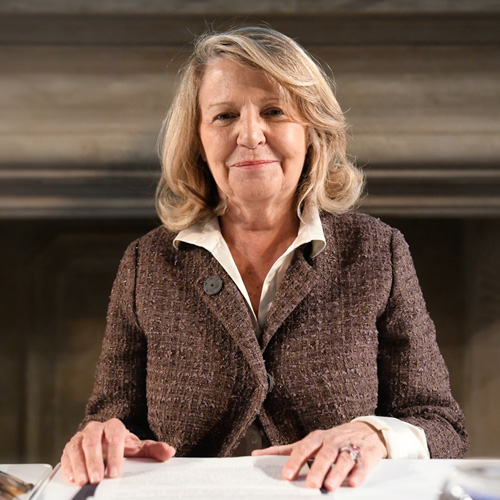
Patrizia Grieco explains the role of ENEL in energy transition
29 March 2019“The green economy and the circular economy will determine the most important changes for our planet”. Patrizia Grieco, Chairman of ENEL, opened with this strong statement the second Innovation Talk of the Spring edition 2019. ENEL, an energy multinational and one of the leading global integrated operators in the electricity and gas sectors, supports the circular economy, an economic system designed to regenerate on its own, thus also guaranteeing its sustainability.
At the center of the discussion with the BBS Community, the emerging need to develop new skills to safeguard our planet’s resources by 2030; the actual agricultural systems, in fact, will no longer be sufficient to guarantee food to the population, and climate change will determine an increasingly incisive lack of water. “Nature has been put in danger by man, and action must be taken immediately”, continued Patrizia Grieco, recounting ENEL’s commitment to tackle climate change by creating new business models. “The resources will not increase, but the population definitely will,” said the Chairman, identifying in the renewable resources the only answer to the problem.
Renewability. This is the main theme that guides the commitment of ENEL, which recognizes as its own the responsibility to create a positive and long-term social impact, placing the customer at the center of the system and moving at the same time towards transversal innovations such as digitalization. In this process, collaboration with startups is fundamental: “Everyone must cooperate towards a circular economy, the thrust of technological innovation will create new business models to which companies must adhere,” said Patrizia Grieco.
The positive impacts of the circular economy are manifold; the European Commission has in fact estimated that the circular economy initiatives could bring, by 2030, economic benefits of 1.8 trillion euros and a reduction of carbon emissions of 450 million tons. As confirmed by the scientific community, our planet needs a shift and the energy transition represents a valid possibility of change, a real evolution implemented by all the major European and non-European economies. The elements that characterize it are decarbonization, the increase in energy efficiency and a greater contribution from renewable energy sources. The goal of ENEL is therefore to reduce carbon dioxide emissions through specific programs and instruments. The Carbon Capture and Storage Project activated by ENEL in 2012, for example, allows the capture and subsequent confinement of CO2 produced by power plants, allowing a drastic reduction of its concentration in the atmosphere.
According to Patrizia Grieco, the actions of a company must be independent of the impact they can have on individual Governments or on the collaboration with them; several political leaders have, in fact, ignored environmental problems, some even denying their very existence. “After an initial moment of skepticism, the Board of Directors showed itself increasingly attentive to the issues of sustainability and environmental impact,” said the Chairman, recalling the process that led ENEL to contribute directly and concretely to the development of a new sustainable economic model. Today, in fact, as many as 60% of ENEL’s stakeholders show meticulous attention to environmental issues.
For more than 10 years, ENEL has been investing in the production of energy from renewable sources and in the development of specific infrastructures. A great contribution to the balance of the network and to the diffusion of renewable sources comes, in fact, from storage systems, a sector in which it aims to reach 600 MW of capacity by 2020. The curiosity of the participants at the Innovation Talk dwelt for a long time also on the subject of electric cars. Today ENEL is the first utility to have joined the Platform for Electro-Mobility: the initiative of companies, associations and NGOs for the promotion of electric mobility in Europe. “From a technological point of view, the company focuses on recharging infrastructures, and on their capillarity even in extra-urban areas.” Today, there are about 28,000 recharging columns managed by ENEL in Italy in Spain.
“The real effort to be made is not the energy transition as such, but to train people. The real challenge is the cultural change. You consumers hold the real power of choice. You are the future,” concluded Patrizia Grieco, who stressed that this is not just an energy transition, but above all an industrial and cultural one.
ENEL has made and will continue to make huge investments to protect the environment but, in order to obtain concrete and lasting results, there is a need for more and more allies.
